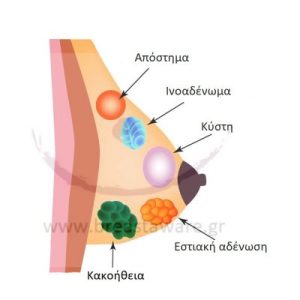
Common Breast Conditions: What You Need to Know
The breast, like any other organ of the body, may develop diseases – most of which are benign and are not directly related to the breast cancer. However, the early diagnosis, the right education and regular monitoring by a healthcare professional breast surgeon are vital for maintaining breast health.
What are the most common benign breast conditions?
The most common Benign Breast Lesions include:
- Simple cysts: Fluid-filled sacs, mostly seen in women of reproductive age.
- Fibroadenomas: Solid, mobile, usually painless tumors, more common in younger women.
- Hyperplasia of the ducts or lobules: Increased number of cells, sometimes with atypical features.
- Mastitis: Inflammation of the breast, typically during breastfeeding.
- Intraductal papilloma: Benign growth inside a milk duct, which may cause nipple discharge from the nipple.
- Focal adenosis and fat necrosis: reactive changes, which may sometimes mimic malignancy on imaging studies.
- Mastalgia (breast pain) and calcifications, , some requiring further investigation.
Important: Although the above conditions are usually benign, Atypical Hyperplasia they may increase the risk of developing breast cancer in the future, without directly causing it.
What should you know about breast cancer?
The Breast cancer is the most common form of cancer in women worldwide, with approximately 1 in 8 women being diagnosed at some point in her lifetime. In Greece, it is estimated that approximately 8,000 new cases each year.
Breast cancer in men
Although much rarer, breast cancer can also occur in men, at a rate of approximately 1 man for every 100 women who develop the disease.
Types of breast cancer
- Invasive ductal carcinoma (~70%): Originates in the milk ducts.
- Invasive lobular carcinoma (~10%): Develops in the lobules of the breast.
- Rare types: Mucinous, papillary, tubular, inflammatory, metaplastic, phyllodes tumors, and Paget’s disease of the nipple..
There are also non-invasive forms such as:
- Ductal carcinoma in situ (DCIS): Confined within ducts, with an excellent prognosis.
- Lobular carcinoma in situ (LCIS): It is not considered malignant, but represents an indicator of increased risk for the development of invasive cancer in the future.
Hereditary breast cancer: The importance of family history
Approximately 5–10% of cases of breast cancer are associated with genetic mutations, primarily in the genes BRCA1, BRCA2, CHEK2 and TP53. Womens with a strong family history of breast or ovarian cancer should consider the possibility of genetic testing in consultation with a specialist physician.
Knowledge is power: Prevention, Screening, Action
Understanding the common breast conditions, whether they are benign or malignant, is the first step toward prevention. The breast self-examination, οι regular imaging examinations (mammography, ultrasonography), and advice from a specialized breast surgeon are crucial for early diagnosis and effective management.
For more information, visit breastaware.gr
At breastaware.gr you will find reliable, scientifically supported content on all breast conditions, along with practical advice for breast prevention and care. Knowledge saves lives — get informed, protect yourself, and support the women around you.
Bibliography::
- Santen RJ, Mansel R. Benign breast disorders. N Engl J Med. 2005;353(3):275-85.
- Lakhani SR, et al. WHO Classification of Tumours of the Breast. 5th ed. IARC; 2019.
- Harbeck N, Gnant M. Breast cancer. Lancet. 2017;389(10074):1134–1150.
- NCCN Clinical Practice Guidelines in Oncology. Breast Cancer, Version 3.2024.
- Giuliano AE, et al. Breast cancer—major changes in the American Joint Committee on Cancer eighth edition cancer staging manual. CA Cancer J Clin. 2017;67(4):290-303.
- National Cancer Institute. Genetics of Breast and Gynecologic Cancers (PDQ®)–Health Professional Version.
- American Cancer Society. Breast Cancer Facts & Figures 2023-2024.
